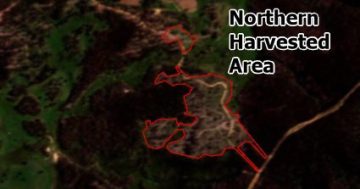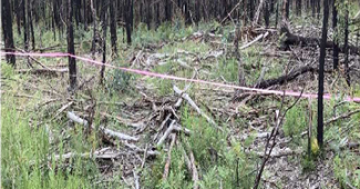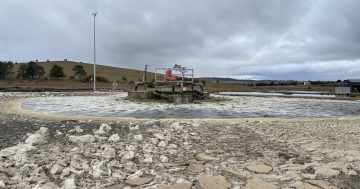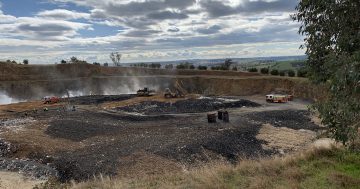
This map shows the areas at ‘Doolondondale’ in Kybeyan where forestry operations took place in 2021. Photo: Land and Environment Court.
Two companies involved in an illegal forestry operation on a farming property south of Cooma have been fined a combined amount of almost $900,000.
Whites Timber Products Pty Ltd was fined $600,000, and White’s Haulage Pty Ltd was fined $270,000 by the NSW Land and Environment Court in December 2024.
This is the court’s second sentencing for the incident. Last year, farmer Michael James Green, who owned the farming property called ‘Doolondondale’ in Kybeyan, was convicted and fined $112,500 for his offences.
Justice Nicola Pain said that the two companies had carried out the native forestry operations on Green’s property between September and November 2021.
She said Whites Timber, the sole director of which was Dennis Gordon White, had been contracted by Green to undertake forestry operations on the property under a Timber Supply Agreement.
Whites Timber then engaged White’s Haulage, run by Dennis’ son Justin Rodney White, as a subcontractor.
According to the court, White’s Haulage conducted the day-to-day forestry operations under the instruction of Whites Timber, while both Justin and Dennis White were onsite managers.
At least 8800 tonnes of pulpwood-grade timber and 985 cubic metres of sawlogs were harvested and the two companies sold the harvested products to timber suppliers.
However, in December 2021, Green contacted Local Land Services (LLS) and raised concerns about the condition of the harvesting areas after the operations.
Dr Julian Wall, who has over 30 years’ experience in natural resource management, told the court that as a result of unauthorised harvesting, basal area and tree retention thresholds were breached and the vegetation had changed to a sparse woodland structure.
“A substantial number of larger and older trees appear to have been harvested,” he said.
“The small quantity of habitat remaining in the post-harvested forest following the forestry operations would not have been sufficient to support many species of native animals that previously resided in the forest.”
Dr Wall said the operations resulted in a reduction of nesting, breeding and foraging habitat, ground moisture and “the capacity of the forest ecosystem to recover over the long term”.
Justice Pain said that other than one tree with an eagle’s nest, no habitat trees had been marked during the companies’ survey of the harvesting areas.
Whites Timber and White’s Haulage both pleaded guilty to three charges. These were one count of failing to retain the minimum number of habitat trees and two counts of reducing the stand basal area to a mean below the minimum limit.
Justice Pain said, “The environmental harm caused by the offences viewed collectively was significant”. She said Dennis and Justin accepted they should have better understood the operation of the Private Native Forestry Code (PNF) Code.
“The defendants’ directors made a significant mistake despite efforts to understand the regulatory context and, according to them, incorrect advice from LLS officers,” she said.
She said one explanation for what happened was that previous methods applied by an experienced team were employed and these methods were not up to the standard now needed to comply with the PNF Code.
Whites Timber hasn’t operated since November 2021 and Dennis, who is 72, does not propose to be involved in timber harvesting again.
Justin said White’s Haulage had taken reasonable steps to minimise the occurrence of an event like this in future.
“The defendants have shown genuine contrition and remorse and have already suffered significant financial impacts with flow on personal impacts to the directors,” Justice Pain said.
She said Green received a large discount when he was sentenced due to his substantial assistance to authorities, as he reported the unlawful forestry operation on his property.
However, she said the two companies had direct control over the offending conduct and were, therefore, in a better position to prevent the consequential environmental harm.
Both companies were convicted of the offences, fined and ordered to pay the legal costs of the NSW Environment Protection Authority.
Original Article published by Albert McKnight on Riotact.











